10 Signs That You Use Introverted Intuition
There is a lot of confusion in the personality community about what introverted intuition is and what it isn’t. Some people I’ve met ascribe planning for the future to intuition, when in fact many sensing types also enjoy planning for the future. Other types consider intuition to be almost psychic or empathic. So what in the world is introverted intuition? How can we understand it in a simple way?
First of all, who uses Introverted Intuition?
Introverted Intuition, or “Ni” as type geeks call it is a cognitive function. Cognitive functions are ways that we use our mind to perceive the world and make decisions. For INFJs and INTJs it’s the most preferred way they use their mind. ENFJs and ENTJs also use Ni as their preferred perceiving process, but it comes after Thinking or Feeling in terms of certainty and assurance.

Because Intuitive-Judgers use Introverted Intuition, they get excited when they can spot a pattern, notice a trend, or spot an insight that isn’t obvious to other people. They’re hungry for information about the deeper meaning of things or how momentary situations play out in the grand scheme of things.
This article contains affiliate links to books on Amazon. If you purchase one of these books, I get a small kickback that I can use to pay for hosting and other demands of this site. I only recommend books I love.
What Is Introverted Intuition?
Introverted Intuition, or “Ni” for short, is a perceiving function that is focused on understanding the deeper patterns and meanings of life. It seeks out underlying connections between seemingly disparate facts, which allows Ni users to make predictions about what will happen next. While it may seem like they are psychic when this happens, their ability to spot these patterns is simply due to their advanced use of Introverted Intuition.
Personality Hacker calls Introverted Intuition “Perspectives.” Why? Because Ni-users “naturally shift perspectives to solve problems until the solution becomes clear. If they become adept at using Perspectives, they may be able to guess at another person’s mood, problem, or mindset.” – Personality Hacker: Harness the power of your personality type to transform your work, relationships and life
Isabel Briggs-Myers said the greatest gifts of Ni are the “flashes of inspiration, the insight into relationships, the imagination, the originality, the access to resources of the unconscious, the ingenuity, and the visions of what could be.”
If you relate to the 10 manifestations of introverted intuition in this article then there’s a good chance you’re an NJ personality type. If you’re unsure, you can check out the 10 signs of extraverted intuition (the function NPs use).
In short, Introverted Intuition is an information-gathering process that focuses on patterns, perspectives, hidden meanings, and future implications. If you want to find out more about what it is, and what Carl Jung wrote on the subject, you can check out my post: The Magic and Mystery of Introverted Intuition.
This post is primarily concerned with looking at the signs of introverted intuition. Here you’ll be able to see what it looks like on the outside and what it feels like on the inside. These practical examples will hopefully make it easier for you to grasp this complex function.
Not sure what your personality type is? Take our new personality questionnaire here. Or you can take the official MBTI® here.
Why is Introverted Intuition So Rare?
I get this question a lot. Introverted Intuitive (NJ) types, make up the smallest percentage of the population of the 16 personality types. NJs make up 8.9% of the national population according to the latest MBTI® Manual. In contrast, SJs (Sensing-Judgers) make up 39% of the national population. NPs make up 23.6% of the population, and SPs make up 28.5% of the population.
But why are Intuitive-Judging types so rare? That’s a tough question to answer. It may be that in order for society to function and thrive, we need fewer seers and more doers. For example, Sensing-Judgers, the largest percentage of the population, tend to be stabilizers. They preserve traditions, focus on practical tasks, and pay attention to details in an effort to create stability, consistency, and a sense of order and routine. Intuitive-Judgers, while necessary, foresee implications, spot patterns, and make predictions. Perhaps we need more pragmatic doers than we need visionary seers; but that doesn’t mean that one group is more valuable than another, or one’s skills are more valuable than another’s. This is just a theory; and it could be entirely faulty, but there’s really no clear answer for this frequently asked question.
“How Do I Know if I Have Introverted Intuition?”
If you’re an introverted intuitive, you’ll look behind the scenes rather than on the surface. Instead of seeing things for what they are, you see how they will transform over time or what they symbolize. The world is full of metaphors and symbols that grasp your attention. A tree isn’t just a tree that produces shade; it’s an ancient guardian, harboring wisdom from the past, offering protection, and symbolizing your own personal growth story. At times, you encounter struggles; your bark may chip, you may lose a branch here and there, or you may have seasons where your leaves fall and you feel tired and worn down. But at other times you blossom. It’s all about what you do with the season you’re in. Are you using those lower-energy, sadder seasons to learn and grow and introspect? Are you using the bountiful seasons to spread joy and nurturing to the world?
The above metaphor is just an example of how an NJ type sees the world. They may not have this exact metaphor when they see a tree; perhaps theirs is different. But the capacity to see metaphors and symbols everywhere is a sign that you’re an Introverted Intuitive type.
If you’re an Introverted Intuitive, you look for ripple-effects. Like a domino chain that ends with one definitive collapse; you see where the last domino will fall. Because of this, you naturally make predictions, foresee potentials, and spot patterns.
If you read on, you’ll find ten more signs that you use introverted intuition!
10 Signs That You Use Introverted Intuition
#1 – You Are Driven By Your Inspiration
Inspiration is the force that drives you, the culmination of a deep-rooted knowing and a vivid vision for the future that propels each step of your life. Sometimes, your inspiration appears out of nowhere, giving you an “aha” moment that’s difficult to explain. The beauty lies in the delicate details of these moments, where the enchantment of inspiration weaves together with your singular perspective, forming a tapestry of creativity and passion that is truly unparalleled
#2 – The More Abstract the Conversation, the More You Enjoy It
You thrive on understanding complex processes and philosophies. The more obscure, abstract, and theoretical the conversation, the more you’re energized and excited by it.
#3 – You Are Individualistic and Independent
You have an insatiable curiosity for the new and unexplored, always seeking out the excitement of fresh experiences. The allure of the tried-and-true pales in comparison to the thrill of venturing into uncharted territory. With introverted intuition you are skeptical of the status quo. You view authority figures and established rules with a healthy dose of skepticism. You dislike conformity, repetition, and routine. Your free-spirited nature thrives on charting your own course and embracing endless possibilities beyond convention’s boundaries.
#4 – You Want To Know What’s “Behind the Facade”
You don’t trust appearances or things said at face-value. You believe that there are layers of meaning to everything, and your goal is to delve into the deepest layer. As an introverted intuitive, you understand that the truth often lies beneath the surface, waiting to be discovered and understood.
#5 – You Need Time to “Daydream”
Introverted intuitives like you need to understand how new information fits into the entire universe. Your mind craves time to imagine and tinker with ideas and theories. You particularly relish the opportunity to detach yourself from external stimuli. By doing so, your mind is free, allowing for the spontaneous emergence of insights. Solitude in a tranquil, dimly lit environment grants your mind the space it needs. It is during these moments that you unconsciously synthesize information, leading to your most profound “aha!” moments of realization.
#6 – You Trust the Unconscious World
To you, unconscious images and symbolic dreams are just as relevant as tangible images and data. What you gather from your five senses is important, but mainly in how it gives you clues about the future, the universe, and the meaning of all things.
#7 – You Get Lost In Meanings
Instead of observing the tangible aspects of the world surrounding you, you perceive the symbolic implications and significance of everything. When you encounter a tree, thoughts of its history, current state, and future, as well as its vital role in our world, come to mind. You contemplate the condition of the environment and envision where this tree will stand in a century or even a millennium.
#8 – You Love Strategizing
Your vision provides the foundation for your strategic planning. You enter a “zone” where you can immerse yourself in thoughts about the future. During this process, you strategize on how to achieve your specific goals and aspirations. Engaging in strategy games can further stimulate your mind and enhance your ability to think critically and strategically
#9 – Your Perceptions Are Hard to Explain in Words
Because many of your intuitions and insights stem from the unconscious and inner world, you might find it challenging to articulate them clearly. When attempting to convey your thoughts, you may stumble or become engrossed in meaning and metaphor, which can be perplexing for others. This can be incredibly frustrating for you, but it’s all part of being an introverted intuitive.
#10 – You Long to Understand “Why”
As an introverted intuitive, you are driven to understand the “why’s” of the universe and how everything fits together. You long to ask deep and penetrating questions but you’ve learned through experience that many people feel uncomfortable when conversation gets into very complex, abstract, or uncharted territory.
Think You Use Introverted Intuition?
A lot of people who have tested as NJ types find that they don’t really relate to these points and that’s because most of the online tests out there are mistyping people. If you truly don’t relate to introverted intuition but still consider yourself an intuitive, then you can explore my eBook: Discovering You: Unlocking the Power of Personality Type to find out more about introverted intuition, the 16 personality types, and the many ways type can show up in your everyday life.
Other Articles You Might Enjoy:
A Beginner’s Guide to Identifying Someone’s Myers-Briggs® Personality Type
The Cognitive Functions Expressed in Famous Quotes
Here’s How You Use Intuition, Based On Your Myers-Briggs Personality Type
Sources:
Psychological Types by C.G. Jung (1974, Princeton University Press)
Building Blocks of Personality Type. A Guide to Discovering the Hidden Secrets of the Personality Type Code by Leona Haas and Mark Hunziker (2014, Eltanin Publishing)
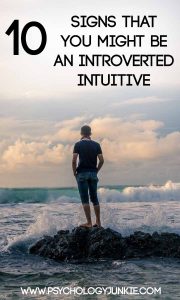


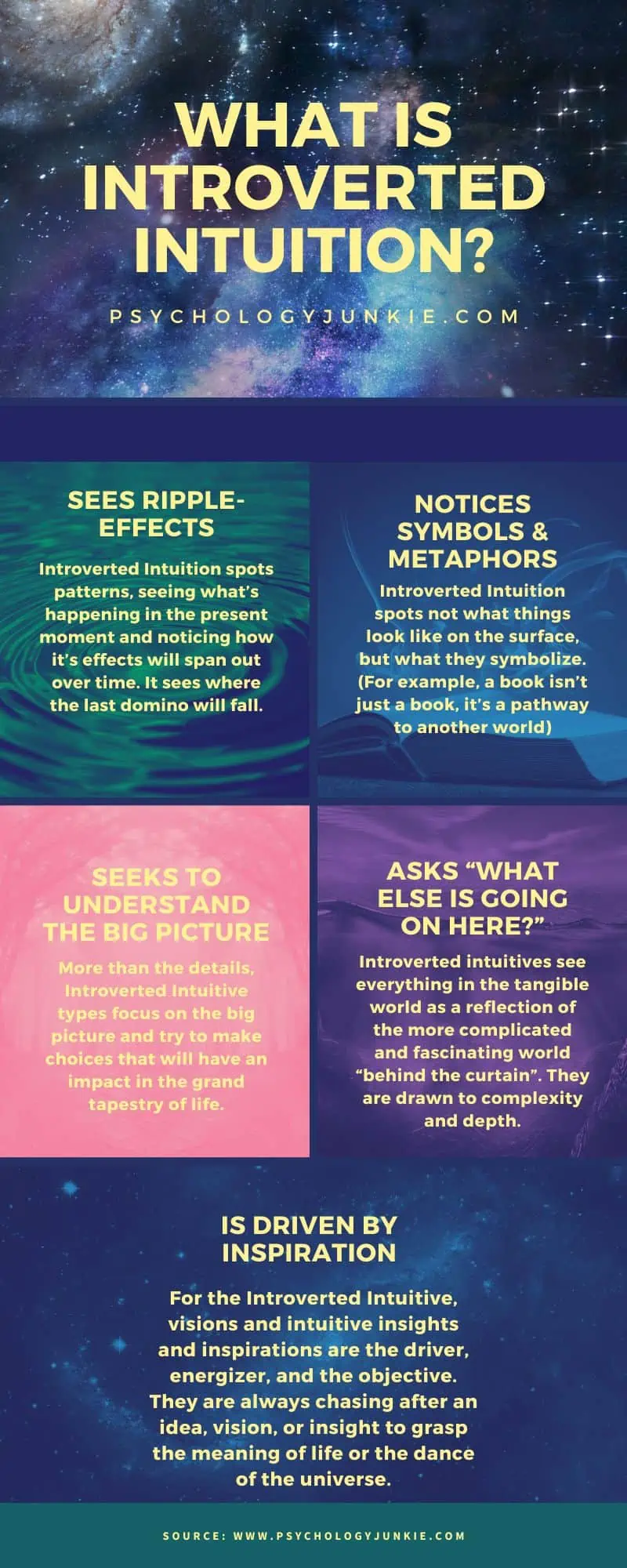


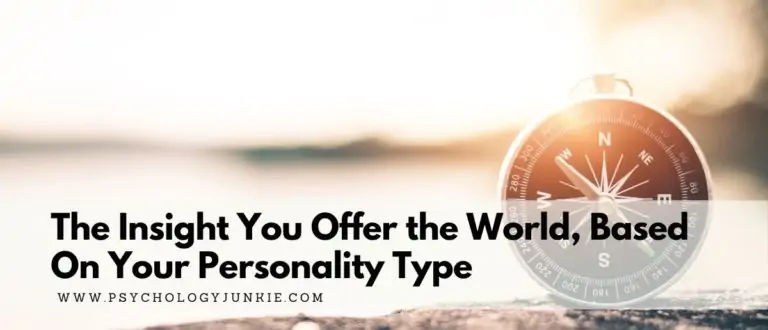

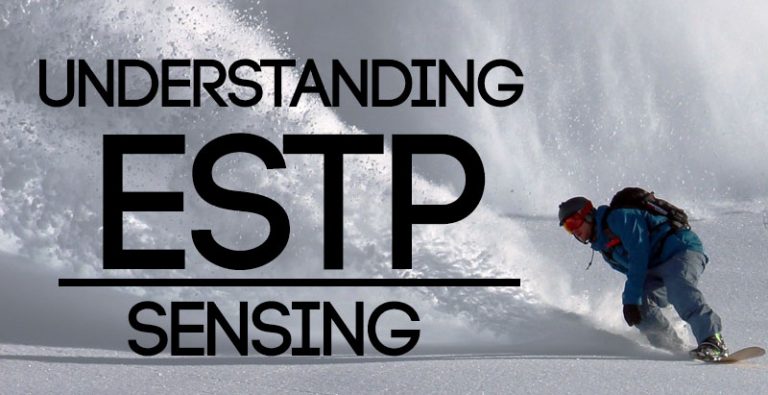
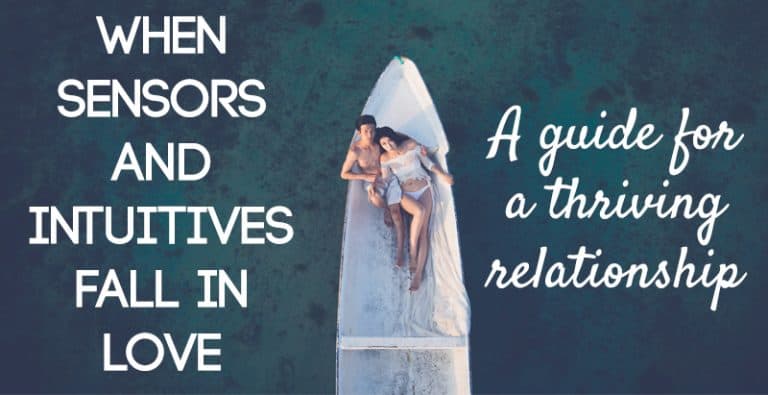
Holy crap! Every single one of these, 100%. That’s me, how did you know?
I don’t agree with a few points – but I winder if it’s because of me somehow repressing my dominant function.
I don’t agree with point 7. the most. I don’t look at trees thinking about their meaning. Just maybe a thought coming by „hm, they’ve been cutting those trees lately”.
I also don’t agree with point 4. Specifically, with how I need to get to the deepest layer of meaning of everything I encounter. I can’t imagibe how busy my mind would be if I paid attention to the deepest meaning of every single thing a person said to me in a conversation. I usually discern the underlying meaning to the point when I’m satisfied with the answer, and I can move on. And that happens when I discern the practical value of what someone said. And although I could dwell on what the person really wanted to mean, I usually don’t. It would be a waste of my mental space, being this finicky.
And finally, I have to disagree on point 2. I prefer to talk about feelings, and get to know the other person/have the other person understand me better. But philosophies are too… concrete for me, while being disattached from now-on feelings, and they bore me. Especially discussing buddhism, or religion as a phenomenon. These are so stereotypical, when somebody touches subjects like those, I am bored. Like from here to hell.
But inventing a whole new religious system, or a silly sounding – at first – philosophy, while also inventing rules, and a way to implement the new system into real life… mmm, that would get me going. C;
That’s very relatable. All points are at least somewhat relatable, though some much more than others. I do agree with point two, but like you said philosophies and such can be rather boring.
Everyone of them is true, i keep doubting if i am an INTJ, tbh i don’t really care what i am, i just want to be certain of what i am (To have Fixed Knowledge)
Although i keep confirming that i am an INTJ.
I think my uncertainty comes from all the Fake INTJs.
Pretty good, probably more accurate for INXJs than ENXJs.
Spot on: 1, 3, 4, 10
The others are about 70-80% true.
I can usually explain pretty well, or at the very least, plainly state, “I don’t know what I know why you should X, but do it anyway because you know I’m always right about things like that!”
And if I were in a dark room alone, I’d probably either fall asleep or start making spooky ghost noises to get someone’s attention, LOL.
How would an Ni child (tertiary) relate to this?
These all apply to both introverted and extroverted intuitives besides maybe 7 and 8.
As an INFJ, i can relate 100% to all points. I think its more important to honestly see how much cognitive functions resonates with one’s personality than just relying on test. Thanks for the awesome article! Very beneficial! 😊🌷
Meeee toooo! I just sat at a “dreaming meeting” to find myself unable to fully communicate my vision. People simply ‘labeled me’ illusive. All that was left was to ask, ‘WHY!!!’ (My favorite question).
This is interesting because I sometimes get typed online as an INFJ or INTJ, but I don’t relate to most of this. At best, I relate to about 50% of 5 of the points, and 100% don’t relate to the other half, except point 10. I definitely relate to that, which is frustrating at times.
About 90% accurate.
i feel this more or less just describe “intuition” rather than “introverted intuision”. Many can be applied to “extraverted intuition as well”
100% accurate. I sometimes leave the unanswered questions to my subconscious to be processed and usually get them answered at least 2-3 days later. I don’t know how this happened but it always does and it surprised me sometimes.
Susan, I’ve spent my 64 years of life with the mistaken thinking I might not ever meet anyone else who really understands what it is like being me – thinking the way I do.
Thank you for – at least from the bit I’ve read up to my writing you this comment – sharing in your writing – information you have learned/gathered during your search to – from what I’ve read so far – gain understanding in who you are, how your mind works. Thank you.
I’ve mistakenly felt alone all these years – until today. This moment.
Now, I want, no – I MUST absorb, then consider how to best use the information you’ve so carefully laid out for your readers, myself included.
Thank you.
You, have given another reason to think further about the information you’ve gathered and presented and it feels like you’ve made a difference in my life- today. Thank you. rh (July 22, 2023)
All are true of me except #6 and #9. I think dreams are interesting, and it’s possible that they can contain some relevant meaning, but it’s also possible that they don’t. Sometimes a cigar is just a cigar. I have a friend who tests as ISTJ, but he’s near the middle of the spectrum for S & N. He always reads meaning into things. If a love song gets stuck in my head, he’ll say “That means you’re in love!” Um, no, it doesn’t.
Beeing intj myself this gave me a bit more confidence on my way of thinking. Although I do not completely agree with #6, maybe bc of my objectoriented and logical way of thinking, facts are more important than dreams. Overall I did find out the way to trigger these hunches myself. They happen a lot more if I collect knowledge about a topic or problem I work on, on mass. The more I have build the big picture in my mind, the more hunches I get. I have to work them back though to articulate the solution and test it to be right. Usually they are true which does give me a stimuli and a type of feeling like a magician.